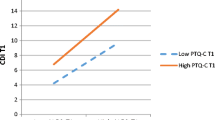Abstract
Examined the relation of dependency and self-criticism to social functioning among adolescents. Subjects were 7th–11th graders from a suburban high school who completed the Depressive Experiences Questionnaire for Adolescents (DEQ-A) and the Inventory of Interpersonal Problems (IIP). The results showed that self-criticism was strongly associated with reporting a greater number of interpersonal problems, particularly in the areas of sociability and control. Dependency was only marginally related to interpersonal difficulties. The results also showed that levels of self-criticism tended to decline steadily across the high-school years, whereas levels of dependency followed a U-shaped curvilinear pattern in which it was higher in the early and late high school years relative to the middle years. Finally, the present study provides initial evidence of a reliable, shortened 20-item version of the DEQ-A.
Similar content being viewed by others
References
Albert, N., and Beck, A. T. (1975). Incidence of depression in early adolescence.J. Youth Adolesc. 4: 301–307.
Armsden, G. C., and Greenberg, M. T. (1987). The Inventory of Parent and Peer Attachment: Individual differences and their relationship to psychological well-being in adolescence.J. Youth Adolesc. 16: 427–452.
Blatt, S. J. (1974). Levels of object representation in anaclitic and introjective depression.Psychoanal. Study Child 24: 107–157.
Blatt, S. J., D'Afflitti, J. P., and Quinlan, D. M. (1976). Experiences of depression in normal young adults.J. Abnorm. Psychol. 85: 383–389.
Blatt, S. J., and Homann, E. (1992). Parent-child interaction and the etiology of dependent and self-critical depression.Clin. Psychol. Rev. 12: 47–91.
Blatt, S. J., Quinlan, D. M., Chevron, E. S., McDonald, C., and Zuroff, D. C. (1982). Dependency and self-criticism: Psychological dimensions of depression.J. Consult. Clin. Psychol. 50: 113–124.
Blatt, S. J., and Shichman, S. (1983). Two primary configurations of psychopathology.Psychoanal. Contemp. Thought 6: 187–254.
Blatt, S. J., Schaffer, C. E., Bers, S. A., and Quinlan, D. M. (1992). Psychometric properties of the depressive experiences questionnaire for adolescents.J. Person. Assess. 59: 82–98.
Blatt, S. J., and Zuroff, D. C. (1992). Interpersonal relatedness and self-definition: Two prototypes for depression.Clin. Psychol. Rev. 12: 527–562.
Carlson, G. A., and Strober, M. (1983). Affective disorders in adolescence. In Cantwell, D. P., and Carlson, G. A. (eds.),Affective Disorders in Childhood and Adolescence: An Update. Spectrum, New York.
Faulstich, M. E., Carey, M. P., Ruggiero, L., Enyart, P., and Gresham, F. (1986). Assessment of depression in childhood and adolescence: An evaluation of the Center for Epidemiological Studies Depression Scale for Children (CES-DC).Am. J. Psychiat. 143: 1024–1027.
Horowitz, L. M., Rosenberg, S. E., Baer, B. A., Ureno, G., and Villasenor, V. S. (1988). The Inventory of Interpersonal Problems: Psychometric properties and clinical applications.J. Consult. Clin. Psychol. 56: 885–892.
Koestner, R., Zuroff, D. C., and Powers, T. A. (1991). Family origins of adolescent self-criticism and its continuity into adulthood.J. Abnorm. Psychol. 100: 191–197.
Mongrain, M., and Zuroff, D. C. (1993).Motivational correlates of dependency and self-criticism: Links to positive and negative affect. Manuscript submitted for publication. University of California at Davis.
Nietzel, M. T., and Harris, M. J. (1990). Relationship of dependency and achievement/autonomy to depression.Clin. Psychol. Rev. 10: 279–297.
Reis, H. T. (1990). The role of intimacy in interpersonal relations.J. Social Clin. Psychol. 9: 15–30.
Riley, W. T., and McCranie, E. W. (1990). The Depressive Experience Questionnaire: Validity and psychological correlates in a clinical sample.J. Personal. Assess. 54: 523–533.
Taylor, S. E., and Brown, J. D. (1988). Illusion and well-being: A social psychological perspective on mental health.Psychol. Bull. 103: 193–210.
Weissman, M., Orvaschell, H., and Padian, N. (1980). Children's symptoms and social functioning: Self-report scales.J. Nervous and Mental Disorders, 168: 736–740.
Zuroff, D. C. (1993).Depressive personality styles: Relations with adult attachment styles. Manuscript submitted for publication, McGill University.
Zuroff, D. C., and de Lorimier, S. (1989). Ideal and actual romantic partners of women varying in dependency and self-criticism.J. Personal. 57: 825–846.
Zuroff, D. C., Igreja, I., and Mongrain, M. (1989). Dysfunctional attitudes, dependency, and self-criticism as predictors of depressive mood states: A 12-month longitudinal study.Cog. Ther. Res. 14: 315–326.
Zuroff, D. C., Koestner, R., and Powers, T. (1993). Self-criticism at age 12: A longitudinal study of adjustment.Cog. Ther. Res. in press.
Zuroff, D. C., and Mongrain, M. (1987). Dependency and self-criticism: Vulnerability factors for depressive affective states.J. Abnorm. Psychol. 96: 14–22.
Zuroff, D. C., Moskowitz, D. S., Wielgus, M. S., Powers, T. A., and Franko, D. L. (1983). Construct validation of the dependency and self-criticism scales of the depressive experiences questionnaire.J. Res. Personal. 17: 226–241.
Author information
Authors and Affiliations
Additional information
This research was funded by a team grant to David Zuroff, Richard Koestner, and Debbie Moskowitz from the Fonds Pour La Formation De Chercheurs Et L'Aide A La Recherche (FCAR-Quebec). Richard Koestner was also funded by a McGill Faculty grant.
Received B.A. from McGrill University. Research interests include personality development and psychosocial adjustment.
Received Ph.D. from University of Rochester. Research interests include motivation, personality, and life-span development.
Received Ph.D. degree from University of Connecticut. Research interests include dependency, self-criticism, and vulnerability to depression.
Rights and permissions
About this article
Cite this article
Fichman, L., Koestner, R. & Zuroff, D.C. Depressive styles in adolescence: Assessment, relation to social functioning, and developmental trends. J Youth Adolescence 23, 315–330 (1994). https://doi.org/10.1007/BF01536722
Received:
Accepted:
Issue Date:
DOI: https://doi.org/10.1007/BF01536722




